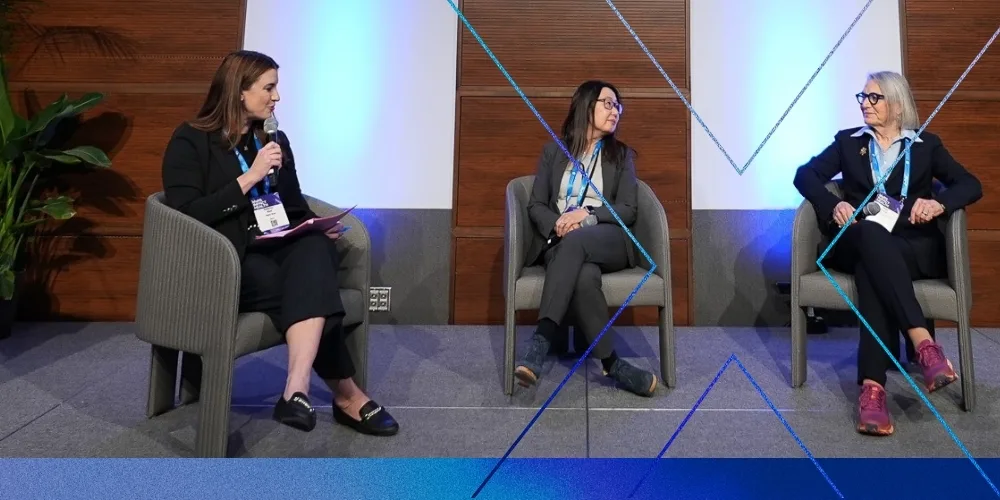Welcome to The Launch Pad!
By MaRS Staff | October 6, 2025

MaRS News has a fresh look!
Greetings from MaRS. Welcome to The Launch Pad, a re-imagined update of our biweekly Mars News newsletter. All the content you know and love is here — stories from the ecosystem, upcoming events, job listings — plus some existing new stuff: must-reads from your favourite MaRSians! A poll! Look for other features in the weeks and months to come.
This inaugural issue arrives at a busy time of the year. The first-ever Toronto Climate Week runs October 1 to 3 (see below for MaRS-related events), and Elevate, Canada’s premiere tech and innovation festival, kicks off a few days later. Our lead story today expands on our recent interview with Ben Waldman, who’s speaking at Elevate, and is the founder of Gander, the buzzy, new, all-Canadian social platform.
We hope you find The Launch Pad enjoyable and informative. And if you have any feedback, suggestions or questions, please drop us a line: media@marsdd.com.
Glorious and free: how Gander’s made-in-Canada social network can protect sovereignty

(Photo illustration by Stephen Gregory, Photo by Gary Bendig on Unsplash)
Prime Minister Mark Carney says that cloud infrastructure is crucial for security, AI and quantum leadership. So crucial, in fact, he’s requested that his new Major Projects Office develop a “Canadian sovereign cloud.” Carney argues this will build the compute capacity and data centres needed “to underpin Canada’s competitiveness, to protect our security, and to boost our independence and sovereignty.”
This idea isn’t exactly new — companies like ThinkOn have been beating the drum of national data protection for years — but it’s heartening to see Carney place sovereign cloud on the same infrastructural level as ports, nuclear reactors and pipelines. We’ve made a related argument here, while also insisting that the feds think more broadly about the role of homegrown innovation in establishing digital sovereignty.
Ben Waldman is tackling the issue from a somewhat different angle. An Ottawa-based creative director, Waldman is one of five founders behind a new social media platform called Gander that launches next month. Made by Canadians and for Canadians, it will live entirely on servers within our borders and adhere to the Charter of Rights and Freedoms. Its content will be hyperlocal, its recommendations informed more by community curation than by manipulative algorithms. At a time when the world’s biggest social networks are controlled by American tech billionaires who have little to no investment in the collective good, and are mired in a toxic soup of disinformation, rage bait and AI slop, Gander promises a kinder, gentler, more maple-infused online forum.
One of the more compelling things about this platform is its potential to help news organizations once again use social meda to reach audiences. The Online News Act, of course, led to Meta blocking Canadian users from accessing news sites, a retaliatory move that has had grievous consequences for local news — and for newer online outlets in particular. Gander could help repair that damage.
Improving access to our own news is vital in shaping our own story. But the question of who has control and ownership of that story is just as important. “One of the primary goals is to make it difficult or impossible for a foreign body to shut us down,” Waldman says. “We need the ability to have our own controls in place — because identifying Indigenous hate in the U.S. may not look the same as labelling similar content in Canada, for example. Our Charter is not the same as someone else’s charter or constitution.”
What Waldman is creating is a social network that prioritizes users over advertisers, and where data and privacy are protected. But social media is just the beginning. To really safeguard our economy, values and democracy, we need to keep building locally — infrastructure, businesses, services.
“There’s so much opportunity right now to do something good, valuable, ethical,” Waldman says. “There’s a hunger for it, and not just among the population. The government needs and wants this stuff. Businesses need and want this stuff. I’m not the first to say this, but more and more we’re going to see sovereignty as a service. Open source technology for your office that is completely sovereign, for example. There are a ton of opportunities — founders just have to grab them.”
Read our full interview with Ben Waldman here.
Stories from the ecosystem
VENTURES: Maclean’s spotlights the 40 most innovative and influential figures currently reshaping Canada, including startups AirMatrix, Fireswarm, Intelligent City and Xatoms. And in the latest issue of Report on Business magazine, several MaRS ventures, such as PocketHealth, DOZR, Electrovaya, Mindbridge, Vention and PolicyMe, made the list of Canada’s top growing companies.
HEALTH: Liquid biopsies could be a kinder, simpler way to detect cancer.
AI: Digital sovereignty’s at the top of AI Minister Evan Solomon’s to-do list, and The Wall Street Journal warns that the AI bubble is about to burst.
CLIMATE: Canadian startup Permalution is combatting water shortages by harvesting fog.
Solve for X

It’s different all over: Embracing the complexity of human biology
We’re hard at work on our fourth season of the MaRS podcast. In the meantime, enjoy this bonus episode on precision treatment in women’s health, featuring researchers Gillian Einstein and Minna Wong.
Upcoming events
- Part of Toronto Climate Week, Building what’s next: Scaling climate solutions in the built environment is a day of dialogue, showcases and presentations around accelerating climate action in the built environment. Thursday, October 2, 9 a.m.–4 p.m. Toronto.
- Also during TCW: the Proptech Collective and MaRS host the Proptech for Planet Mixer, a relaxed evening of networking and ideas-sharing. Thursday, October 2, 5:30–7:30 p.m. Toronto.
- Catch actor Simu Liu, OpenAI’s Chris Lehane, entrepreneur Arlene Dickinson and scores of other tech leaders, policy-makers and creatives at this year’s edition of Elevate. October 7–9. Toronto. (Use the code MARSELEVATE to get 20 percent off ticket prices.)
- The Azure Human/Nature conference on climate change adaptation brings together architects, urbanists, business leaders and more to spark collaboration on greener spaces and cities. October 29 and 30. Toronto.
- MaRS Climate Impact is back, with special guests Adam Becker (author of More Everything Forever), Sightline Climate’s Kim Zou, NSTX’s Chris Bryson and more. Early bird tickets available now. December 2 and 3. Toronto.
For more, visit our events page.
Pulse Check

How can Canada become a leader in AI-driven research?
At the Acceleration Consortium’s 2025 Accelerate Conference, we asked experts what it will take to better support AI-driven research and materials development. In this 90-second video we share their insights.
Careers: The hottest jobs in tech
- GHGSat, which uses satellite technology to combat climate change, is hiring for several positions, including emissions scientist, business development manager and U.S. government advisor/consultant. (Montreal and other cities.)
- Healthtech startup Able Innovations is looking for implementation specialists in Vancouver and St. Johns, a firmware engineer in Toronto, and other positions. (Toronto)
- MindBridge, a global leader in financial risk discovery and anomaly detection, is looking for an AI research scientist, applied data scientist and business development representative, among other roles. (Ottawa)
For more, visit our jobs page.
In the queue: What we’re reading, watching and listening to at MaRS
This week: MaRS startup advisor Katie Hayes, who’s hosting the Pitch Decks & Playdates roundtable at Elevate, shares what she’s been reading lately.
- These Memories do Not Belong to Us: “The debut novel by Yiming Ma is set in a futuristic world where China’s become the global superpower and a new technology allows memories to be bought and sold. Surprisingly hopeful for a book set in an eerily familiar dystopia.”
- Moral Ambition: “Dutch scholar Rutger Bregman’s latest asks readers to think critically about how they spend their limited time (in the workforce and on the planet). He challenges us all to make the world ‘wildly better’ — something that many folks in the MaRS ecosystem model by building in climate and healthcare.”
- Rejection: “Tony Tulathimutte’s incredibly inventive and unique series of short stories exposes what it’s like to be a young man who’s chronically online. It’s unlike any other book I’ve read, and I owe it a re-read after Charlie Kirk’s assassination.”
- The Measure: “I’d describe Nikki Erlick’s latest as a ‘dystopian beach read’ — easy to get through, fascinating premise. One morning in the not-too-distant future, every adult in the world wakes up to a box containing a string that indicates the length of their life. Drama ensues, with ‘short stringers’ and ‘long stringers’ alike coping with this new information.”
- We Found a Hat: “I spend a lot of time reading to little ones these days, and Canadian author Jon Klassen’s books are just hilarious and excellent. A particular child-friendly comedy noir that I recommend whether you have kids or not!”
Sign up for our newsletter
 MaRS Staff
MaRS Staff